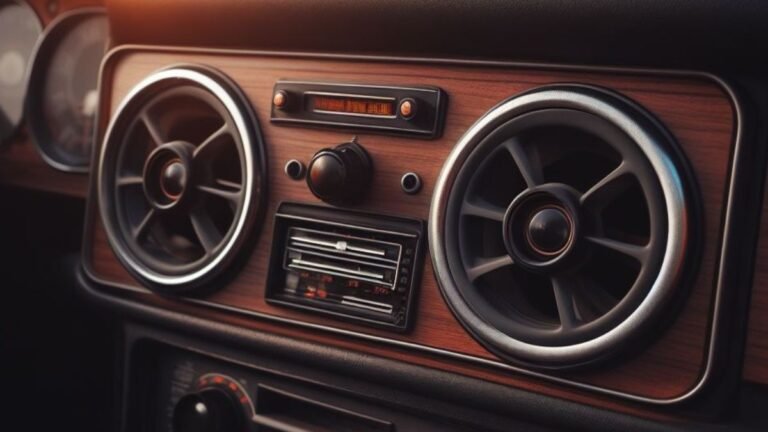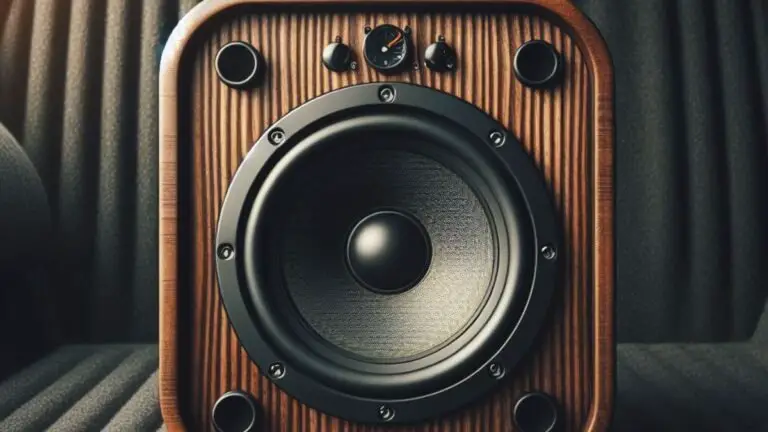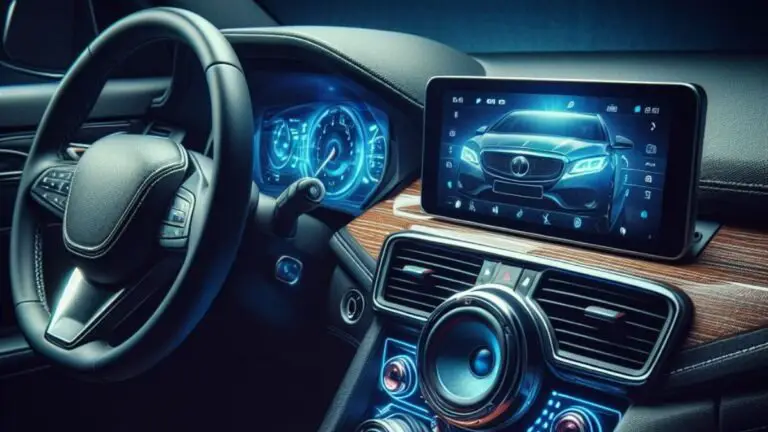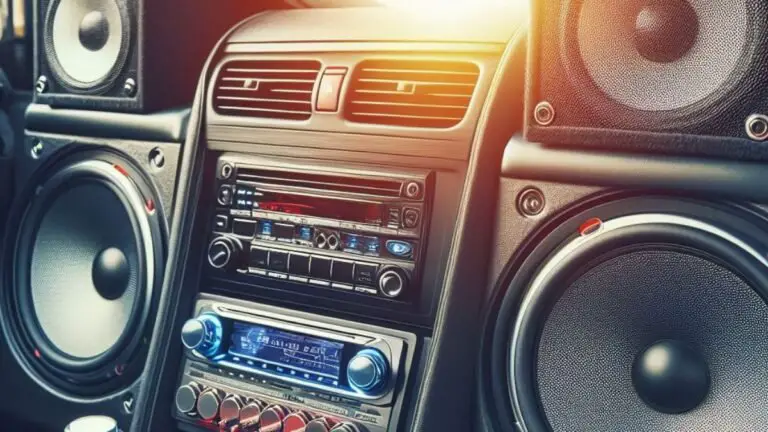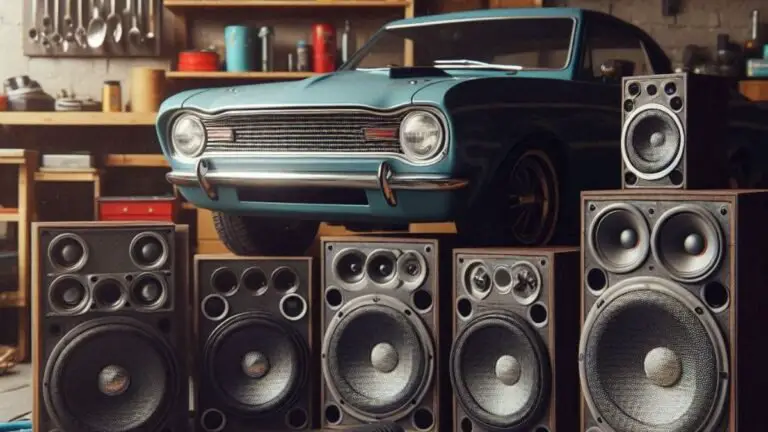What Speakers Fit My Car? Best Detailed Guide of (2024)
Do you want to upgrade your sound system in the car and don’t know what are the right speakers? If you want to enhance your sound experience in your car, then the new and perfect-fit speakers can change the game.
If you’ve ever wondered, “What speakers fit my car?” you are not the only one who thinks of this. We are here to help you out with this task.
There are many options available and you must know all the important factors before installing a new speaker.
In this article, we are going to figure out every important factor that is important to know before you find the right speakers for your car.
So you can follow along and learn about improving your car’s sound system in the below simple guide.
So let’s dive into the article and learn about this interesting task!
What Size Speakers Are in My Car?

First, you need to figure out the size of your car speakers that are already installed. Finding the right fit is important if you want the perfect sound quality.
To discover your car’s speaker size, you have to start by checking the owner’s manual or the door panels for specifications. You can measure the current speakers or check online by giving your car model and size, so you will get the complete dimensions.
Remember, if you find the right installation, then it’s going to be a perfect fit and sound quality in your car. So, grab a measuring tape or consult the manual – your audio adventure awaits!
The Differences Between Speaker Sizes
When it comes to car speakers, size does matter, and if you understand the differences, you can elevate your audio experience. Let’s break it down:
1. Sound Output:
- Larger speakers generally produce deeper bass tones.
- Smaller speakers are good at reproducing higher frequencies.
2. Installation Space:
- Compact cars may have limited space, so using a smaller speaker is a practical choice.
- Bigger vehicles like trucks or jeeps can use larger speakers for a fuller sound.
3. Bass Response:
- Big speakers move more air, delivering powerful bass.
- Smaller speakers might need some additional things for robust low-end performance.
4. High-Frequency Clarity:
- Smaller speakers often handle high frequencies more accurately.
- Larger speakers cannot provide the proper details but they excel in providing a thumping bass.
Choosing the size of speakers also depends on the quality of sound that you like. Whether you select a subtle upgrade or a full-blown audio overhaul, if you understand all these guidelines, then you are going to get the perfect audio quality in the car.
Importance of Choosing the Right Fit Size Speakers for Your Car

Selecting the right size speakers for your car is more than just a technicality, it’s also very important to improve your driving experience. Here’s why getting the size right matters:
1. Optimal Sound Quality:
Properly sized speakers ensure that your audio system operates at its best, which can deliver clear and balanced sound. If your speakers match the size of your car, you can get audio without distortion.
2. Easy Installation:
If you get the right-sized speakers, you can easily install them without using any other material or changes. This makes the installation process smoother, whether you’re a DIY enthusiast or relying on professional help.
3. Maximizing Power Handling:
When speakers are the correct size, they can handle the power output from your car’s audio system more efficiently. This maximizes their performance and longevity, which can prevent damage from mismatched power levels.
4. Enhancing Resale Value:
If your car has the super audio quality with the right speakers, then it can also attract future buyers. A well-maintained and thoughtfully upgraded audio system can set your vehicle apart in the resale market.
How to Choose The Right Fit Speakers for Your Car?
5 THINGS TO CONSIDER WHEN CHOOSING A CAR SPEAKER
Choosing the right car speakers involves more than just grabbing the first ones you see on the shelf. Here are five key considerations to ensure you make the best choice:
1. Car Speaker Amount: How Many Speakers Are in My Car?
- Take stock of your current speaker setup. You have to check whether you are using the 2 speakers system or using a surround system with too many speakers in the car. If you understand your existing setup, you can make the right decision about whether to replace all speakers or focus on specific ones.
2. Car Speaker Sizes: What Size Speakers Are in My Car?
- Size matters. You can check the car’s manual, or just measure the current speaker size. Choosing speakers that fit seamlessly into your car can help you to make an easy installment in your car.
3. Car Speaker Impedance:
- Impedance, which is measured in ohms, is important for matching speakers to your car’s audio system. You have to make sure that the new speakers’ impedance aligns with the recommended range in your car’s specifications to prevent potential damage.
4. Car Speaker Power Handling:
- Understanding power handling helps to prevent underpowering or overpowering your speakers. You must match the speakers’ power handling capabilities with your car stereo’s output for the best performance and durability.
5. Car Speaker Sensitivity:
- Sensitivity tells you how efficiently a speaker converts power into sound. Higher-sensitivity speakers require less power to produce the same volume, which makes them ideal for lower-powered car stereos. You have to figure out your car’s audio system power when you’re selecting the speakers.
By considering these five factors—speaker amount, sizes, impedance, power handling, and sensitivity—you’ll be well-equipped to choose the best car speakers.
TYPES OF CAR SPEAKERS
When it comes to upgrading your car’s audio system, you must know about the different types of car speakers before you get the best one.

Here’s a breakdown of three common types:
1. Tweeter Speakers:
- Role: Tweeters are responsible for reproducing high-frequency sounds, which include cymbals, vocals, and other details that add clarity and sparkle to your music.
- Placement: Normally, tweeters are placed at higher places in the car so it can distribute the frequencies at equal levels like near the windshield or side windows.
- Consideration: If you like to hear loud sounds with many details, the tweeters are a good option.
2. Midrange Speakers:
- Role: Midrange speakers handle the frequencies between tweeters and subwoofers, which cover the vocal and instrument ranges.
- Placement: These are commonly found on the dashboards that provide a sound that is both loud and contains details.
- Consideration: If you prefer a well-rounded audio experience with clear vocals and instrumentals, midrange spears will be a very good choice.
3. Subwoofers or Woofers:
- Role: Subwoofers or woofers are best with low-frequency sounds, which provide the deep bass that adds impact to your music.
- Placement: These speakers are mostly found in trunks or in proper spaces that are bigger due to their large sizes.
- Consideration: If you enjoy genres like hip-hop, electronic, or any music where bass is a standout element, you must invest n good quality subwoofers for the best quality audio.
Choosing the right combination of these speakers depends on your musical preferences and desired audio profile.
Common Car Speaker Sizes

- 6.5-Inch Speakers:
6.5-inch speakers are the most popular choice who like to listen the car music. They can offer a very good sound that is balanced and can fit in the doors very easily.
- 5.25-Inch Speakers:
5.25-inch speakers are an (able to do many different things well) option, which can provide a super quality and they also get installed very easily.
- 4-Inch Speakers:
These are compact speakers that are best for the cars that are small. While they may not produce as much bass as larger sizes, they can still give you a better sound quality. These are good for those small cars that have very little space for this purpose.
- 3.5-Inch Speakers:
These speakers are used for sound that have a higher frequency, such as tweeters.
- 5-Inch Speakers:
These 5-inch speakers maintain the balance between size and sound quality. They can fit into many car models and give you the same extraordinary sound quality.
- 6-Inch Speakers:
6-inch speakers are a common choice if you want to upgrade the factory-installed car speakers. They provide improved sound quality and a higher sound experience.
- 8-Inch Speakers:
If you want an improved bass and don’t want a very higher and loud sound, 8-inch speakers offer a good agreement between size and low-frequency performance.
- 10-Inch Subwoofers:
Subwoofers are very good at producing deep bass. A 10-inch subwoofer can provide powerful low-end frequencies, which can improve your car’s sound system.
- 12-Inch Subwoofers:
If you’re a bass fan, 12-inch subwoofers can deliver very loud and impactful bass and can create a very good sound quality.
- 15-Inch Subwoofers:
If you’re a fan of listening to very loud music, 15-inch subwoofers are the go-to choice. They can produce earth-shaking bass if they are properly set up.
WHAT TO BUY FIRST?

Overall Consideration:
1. Balanced Approach: For a well-balanced audio system, many people like to upgrade all the components slowly. And this starts with midrange speakers, adding tweeters, and then installing subwoofers.
2. Budget and Priorities: You should also consider your budget and priorities. If deep bass is your top priority, begin with subwoofers. If you want a clearer and more detailed sound, you can start with midrange and tweeters.
Remember, the beauty of upgrading your car’s audio system is that you can change it to your preferences over time.
FAQs
1. What Speakers Fit My Car?
Choosing the right speaker size for your car is like finding the perfect pair of shoes. You can have a look at your car’s manual or simply measure the current speakers. It’s like picking shoes that fit – get the right size, and your car’s audio will walk the talk.
2. How do I know which stereo fits my car?
You have to check the manual for your car or look online for stereo models compatible with your make and model. And it is explained above in more detail. You can check it out again.
3. Can I put any speakers in my car?
Not all speakers are created equal, just like not all ingredients go well in every recipe. So make sure that the speakers match the size and power of your car to avoid any problems in the future. It’s like cooking – choose the right ingredients for a delightful dish.
4. Are bigger car speakers louder?
Size doesn’t always mean volume. It’s about how the speakers handle sound. You have to consider factors like sensitivity and power handling. It’s like people – some may be big but not necessarily loud, while others, despite being smaller, pack a punch!
5. Do I need an amp for my car speakers?
An amp is like a personal trainer for your speakers, giving them the power to perform at their best. If you want your speakers to flex their musical muscles, consider adding an amp. It’s like upgrading from a casual stroll to a power walk – more energy, more impact!
Conclusion
In conclusion, it’s important to find the right fit speakers for your car which can be very enjoyable for you in the future. It’s not about the biggest or loudest; it’s about the perfect fit.
Don’t be curious, just relax and choose the speakers that are according to your car’s model. Don’t insert very big or very small speakers and damage your car. And also maintain your speakers to keep them in good condition.
Besides finding the right fit car speakers for your car, you should also focus on your driving while listening to the music. Because it’s not the priority. It can just make you feel easy while driving.
So hopefully, you have learnt about how to find the right speakers and many of your queries have been cleared. So make sure you follow these guidelines for vets’ results.
Great Journey!


